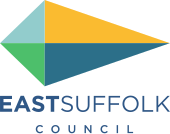East Suffolk District
The district is on the coast, facing the North Sea. Much of the coast and adjoining areas lies within the Suffolk Coast and Heaths, a designated Area of Outstanding Natural Beauty. Some northern parts of the district lie within The Broads.
The neighbouring districts are Babergh, Ipswich, Mid Suffolk, South Norfolk and Great Yarmouth.
History
The district was formed on 1 April 2019 as a merger of the two previous districts of Suffolk Coastal and Waveney. The two councils had previously been working in partnership since 2008.
Although it has the same name, the modern district covers a smaller area than the former administrative county of East Suffolk, which was abolished in 1974 under the Local Government Act 1972.
Governance
East Suffolk Council | |
|---|---|
 | |
| Type | |
| Type | |
| Leadership | |
Chris Bally since 2022 | |
| Structure | |
| Seats | 55 councillors |
 | |
Political groups |
|
| Elections | |
Last election | 4 May 2023 |
Next election | 6 May 2027 |
| Meeting place | |
| East Suffolk House, Station Road, Melton, Woodbridge, IP12 1RT | |
| Website | |
| www | |
East Suffolk Council provides district-level services. County-level services are provided by Suffolk County Council. The whole district is also covered by civil parishes, which form a third tier of local government.
In the parts of the district within The Broads, town planning is the responsibility of the Broads Authority. The district council appoints one of its councillors to sit on that authority.
Political control
The council has been under no overall control since the 2023 election, being run by a coalition of the Greens, Liberal Democrats and an independent councillor, led by Green councillor Caroline Topping.
Political control of the council since 2019 has been as follows:
| Party in control | Years | |
|---|---|---|
| Conservative | 2019–2023 | |
| No overall control | 2023–present | |
Leadership
The councillors of the two previous districts formed a shadow authority in the year leading up to the council's creation in 2019. The shadow authority was led by Conservative councillor Mark Bee, leader of the outgoing Waveney District Council. He was unsuccessful in securing a seat on the new council at its first elections in May 2019. From East Suffolk Council's first meeting after coming into effect, the leaders of the council have been:
| Councillor | Party | From | To | |
|---|---|---|---|---|
| Steve Gallant | Conservative | 22 May 2019 | 7 May 2023 | |
| Caroline Topping | Green | 24 May 2023 | ||
Composition
Following the 2023 election and subsequent by-elections and changes of allegiance up to June 2024, the composition of the council was:
| Party | Councillors | |
|---|---|---|
| Green | 16 | |
| Conservative | 15 | |
| Labour | 12 | |
| Liberal Democrats | 10 | |
| Independent | 2 | |
| Total | 55 | |
The next election is due in 2027.
Elections
East Suffolk comprises 55 councillors representing 26 wards, with each ward electing one, two or three councillors. Elections are held every four years.
Premises
The council is based at East Suffolk House, opposite Melton railway station. The building was purpose-built for the former Suffolk Coastal District Council and opened in 2016, becoming headquarters of the new East Suffolk Council following the formal merger in 2019.
Towns and parishes



The whole district is divided into civil parishes. Thirteen of the parish councils have declared their parishes to be towns, allowing them to take the style "town council", being:
See also
- 2019 structural changes to local government in England
- West Suffolk District, another district that was created in Suffolk on 1 April 2019
References
- ^ UK Census (2021). "2021 Census Area Profile – East Suffolk Local Authority (E07000244)". Nomis. Office for National Statistics. Retrieved 5 January 2024.
- ^ Ministry of Housing, Communities and Local Government (24 May 2018). "The East Suffolk (Local Government Changes) Order 2018". legislation.gov.uk. Retrieved 12 August 2018.
- ^ "Suffolk now has 'largest district council in country'". BBC News. 1 April 2019. Retrieved 5 January 2024.
- ^ "Council minutes, 24 May 2023". East Suffolk Council. Retrieved 5 January 2024.
- ^ Hanson, Reece (8 November 2022). "East Suffolk Council's new chief executive confirmed". East Anglian Daily Times. Retrieved 5 January 2024.
- ^ "Local Government Act 1972", legislation.gov.uk, The National Archives, 1972 c. 70, retrieved 31 May 2023
- ^ "Election Maps". Ordnance Survey. Retrieved 21 September 2023.
- ^ "Who we are". Broads Authority. Retrieved 6 December 2023.
- ^ "East Suffolk to be run by Green/Lib Dem coalition". East Anglian Daily Times. 18 May 2023. Retrieved 4 January 2024.
- ^ "Council minutes". East Suffolk Council. Retrieved 23 June 2022.
- ^ "Local elections 2023: live council results for England". The Guardian.
- ^ "East Suffolk". Local Councils. Thorncliffe. Retrieved 21 July 2024.
- ^ "The East Suffolk (Electoral Changes) Order 2018", legislation.gov.uk, The National Archives, SI 2018/1374, retrieved 5 January 2024
- ^ "Headquarters". East Suffolk Council. Retrieved 5 January 2024.
- ^ Bareham, Dominic (30 September 2022). "Suffolk council sells former offices for more than £5 million". East Anglian Daily Times. Retrieved 5 January 2024.
- ^ "Town and parish councils". East Suffolk Council. Retrieved 5 January 2024.